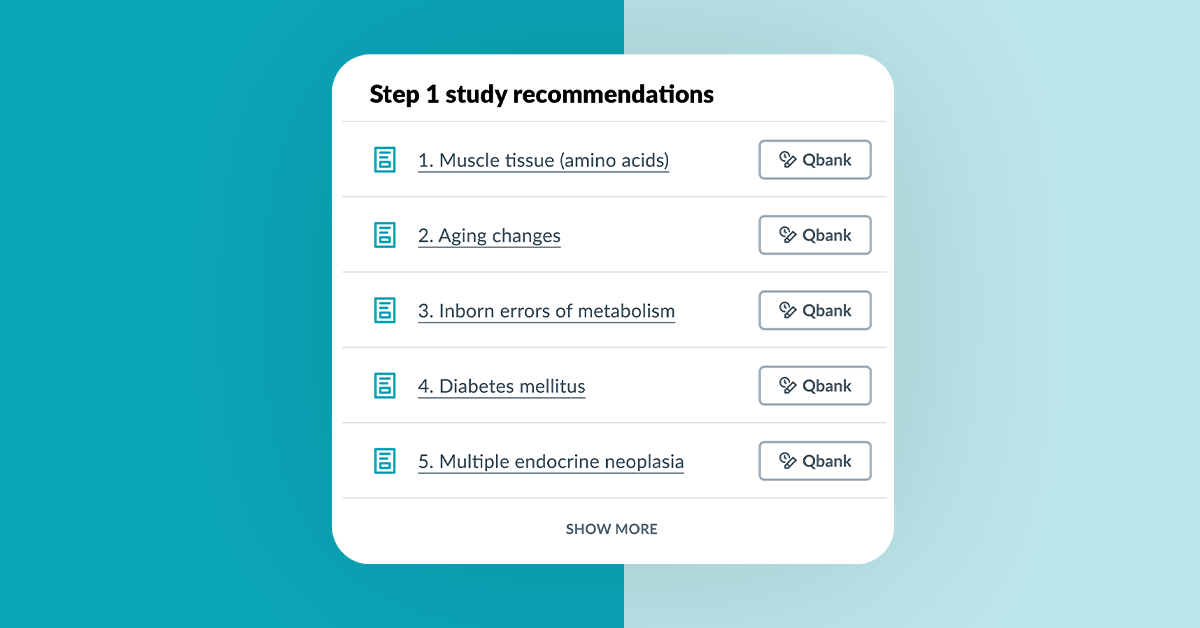Ten Challenging Step 1 Topics

The USMLE® Step 1 exam is well known for covering a wide range of topics often linked to two whole years of pre-clinical medical education. As a result, properly managing your study efforts in the lead-up to exam day can be very challenging.
Nevertheless, devising a study plan that covers the essentials is made easier by doing a little bit of research into Step 1’s content distribution. Armed with this knowledge, getting that high-yield Step 1 information down is simply a matter of budgeting your time wisely.
The relative difficulty of Step 1 topics can also pose a challenge to Step 1 studiers. Here, we’ll introduce you to some of the most challenging ones and tips for mastering each.
Ten challenging Step 1 topics
While all students are different and will find some areas easier than others, the following is a list of topics that most often frustrate students or surprise them on test day (pro tip: click on the links below to find all the info you need for each of these topics):
1. Principles of medical law and ethics
Step 1 questions relating to legal and ethical topics are challenging because most of them have academic backgrounds that do not place a strong emphasis on the social sciences. Consequently, it can take a little bit more time to settle into the mode of thinking like a lawyer or philosopher.
2. Statistical analysis of data
While statistics give rise to much of the conceptual rigor of evidenced medicine, that doesn’t mean one has to love the discipline’s jargon and easily confused concepts. On top of that, most students encounter this topic very early on in their medical education and it’s only natural that some dust needs to be shaken off before test day.
While the chart of acid-base disturbances (below) is fairly difficult to commit to memory, a further complication comes from understanding the underlying pathologies. A wide range of medical issues can cause acid-base disturbances, and knowing the unique characteristics of each can be helpful on test day.
This memorization-heavy topic has a strong link to pathology. As a result, this topic is more likely than other biochemical concepts to show up on the Step 1 exam.
Few students would claim that immunology is their strongest science subject. Nevertheless, hypersensitivity reactions are incredibly common in the real world and their frequent appearance on Step 1 exams reflects this.
Valvular diseases have a wide range of causes and can affect patients of all age groups and health statuses. Pay close attention to the location and quality of each heart murmur. When combined with patient history, this can be key to making the right diagnosis.
Distinguishing between glomerular diseases often requires a strong foundation in both histology and renal physiology, two challenging topics that students often struggle with.
8. Overview of antibiotic therapy
You should be familiar with the utility, mechanism of action, resistance, and side effects of each antibiotic drug you encounter. On top of that, it can be challenging to keep the names of similar-sounding pharmaceuticals straight.
Patients with blood-borne neoplasms often present with a similar collection of symptoms. In many cases, paying attention to key histological markers and differentiating information within the medical history is key to making the right diagnosis.
10. Acyanotic congenital heart defects
Congenital heart defects are the intersection of embryology and cardiac physiology, two subjects with rich and challenging concepts.
The nature of difficult Step 1 topics
For some students, broad categories of Step 1 content can cause them to pull out their hair in frustration (looking at you, Biochemistry). In these cases, it can be helpful to take a further step back to understand what exactly is hampering your efforts.
For example, some students trip up on topics that place emphasis on memorizing discrete information. When studying topics like biochemistry, microbiology, and pharmacology, you’ll want to resort to whatever tools help information settle into your mind. Tools that could be helpful to you at this stage include flashcards, mnemonic devices like the AMBOSS add-on for Anki, and interactive tables like those featured on AMBOSS.
Alternatively, conceptually heavy topics like physiology and pathophysiology can also throw students for a loop. Exam questions related to these topics rely on pathways and causal chains full of interconnected elements.
For these topics, it can be helpful to construct a functional system (using a schematic in your head or on paper) before tinkering with each of its moving bits. Tracing the effects of each change on the whole system can help you better understand each of that system’s moving parts. In fact, modifying just one or two variables is often how diseases have their effect on the body, so this type of thinking will come in handy for years to come!
Spending a bit more time on the above collection of topics can hopefully provide you with a few extra insights you will be able to utilize on test day. No matter how difficult any topic may seem, please keep at it! We’re confident that you will be ready.
Learn the most important Step 1 concepts with the 30-day High-Yield Step 1 Study Plan.


